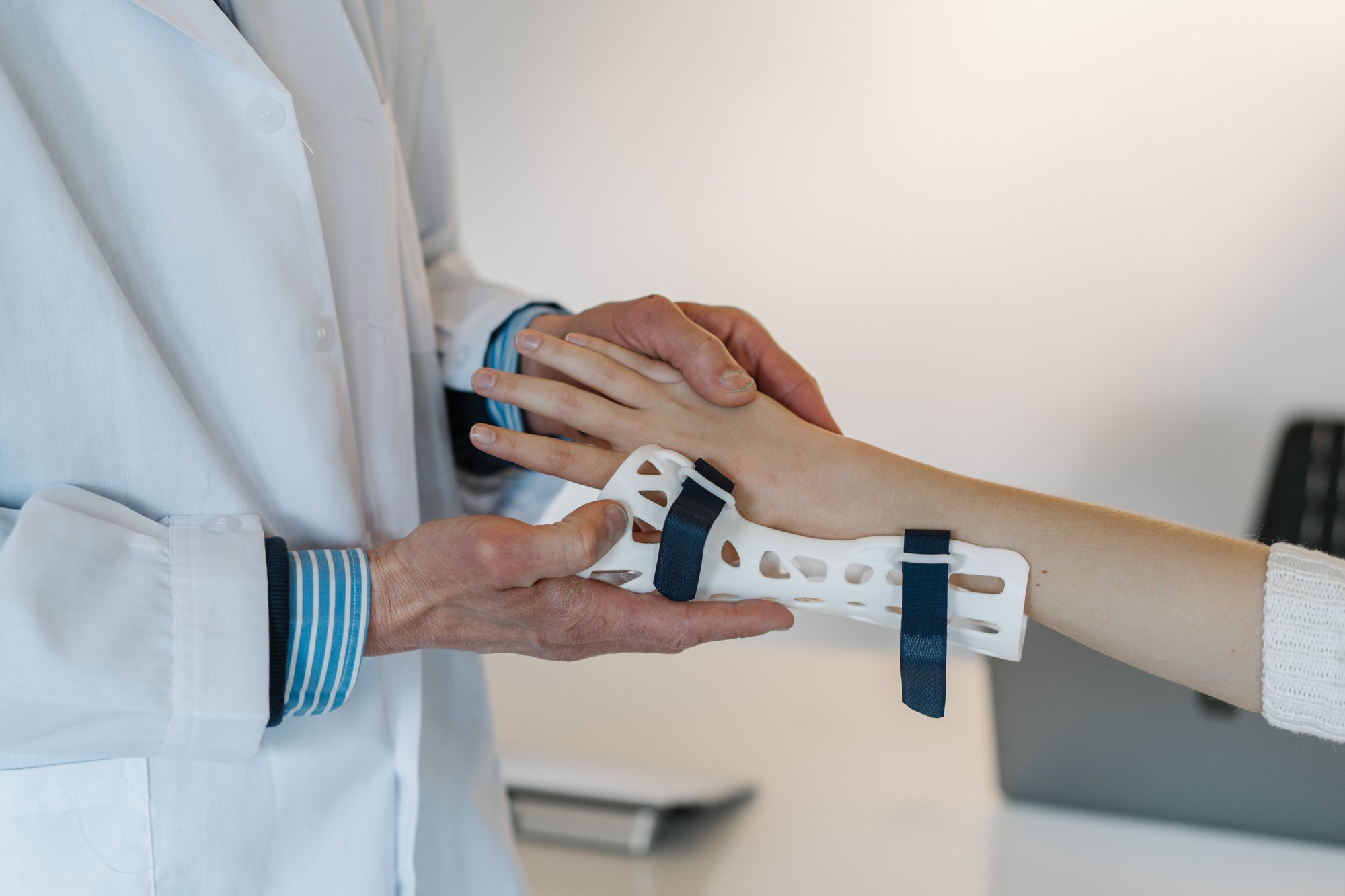Orthopedic Nursing: How to Become a Successful Orthopedic Registered Nurse

The great variety of specialties to choose from is one of the main selling points of a nursing career. You can find a nursing specialty that you’re really passionate about, which meets your needs and is tailored to your personality.
One such potential career path for aspiring nurses is orthopedics. Everything you need to know to work as an Orthopedic Nurse, you’ll be able to find in this comprehensive guide. How to become an Orthopedic Nurse? How long would it take? How much can you expect to earn once you secure a position in the orthopedic field? That – and much more – will be the subject of this article.
Let’s start exploring the ins and outs of this wonderful career.
What is an Orthopedic Nurse?
Orthopedic Nurses, also known under the shorter version of the name – Ortho Nurses, are healthcare professionals who care for patients suffering from musculoskeletal issues. Their area of expertise – musculoskeletal diseases, disorders, and problems includes, among other things, broken bones, fractures, arthritis, osteoporosis, joint replacements, and genetic malformations.
When the patient’s musculoskeletal issue calls for surgery, the Orthopedic Nurses’ job often involves assisting in orthopedic surgeries. This means Ortho nurses are present and responsible for all the stages of an operation. Orthopedic Nurses provide pre-operative care and education, and in some cases, they assist surgeons during the procedure. Also, they offer postoperative care and help patients recover their strength and range of motion after undergoing surgery. Additionally, Orthopedic RNs have extensive training in casting, traction, pain management, and usage of mobility devices. Another critical aspect of their job is educating patients on efficient ways to alleviate symptoms or pain, prevent future injuries, or avoid post-op complications.
How to Become an Orthopedic Nurse?
If you’re interested in a career in the exciting field of orthopedic nursing, then probably one of the first questions on your mind is: How do I become an Orthopedic Nurse? As it turns out, the schooling and training path for Orthopedic Nurses is relatively straightforward. Find all the essential information in the step-by-step guide below:
Step 1. Enroll in an accredited nursing program
Once you decide to pursue orthopedic nursing as a career, the first step to accomplishing your goal is finding and enrolling in an accredited nursing program. To become a Registered Orthopedic Nurse, you can enroll in an ADN program or a BSN program. Getting your ADN – Associate’s Degree in Nursing – takes around two years. A Bachelor’s Degree in Nursing (BSN) can be obtained in around four years. While ADN is still accepted as the minimum educational requirement for Ortho Nurses, hospitals increasingly ask for BSN degrees.
Quality education is the crux of nursing practice. That’s what makes this first step – choosing a nursing program – all the more important. Nightingale College’s BSN program is designed to advance your nursing skills and prepare you to become the best nurse you can be in as few as 32 months. If you are already an ADN-trained nurse, you can opt for our online RN-to-BSN program and advance your degree and knowledge to meet the needs of an orthopedic career.
Step 2. Pass the NCLEX-RN
Once you complete the nursing program, the next step is to sit for the NCLEX-RN. This comprehensive exam is your ticket toward a career as a Registered Nurse. You only become a full fledged licensed RN after passing the NCLEX-RN.
Step 3. Start working
Now that the time you spent studying culminated with RN licensure, you can move on to the next phase of your orthopedic nursing journey: gaining experience in the field.
Step 4. Consider getting certified
While getting certified is a voluntary decision for Registered Nurses, there are many advantages to pursuing certification. These benefits range from enhanced career opportunities to increased recognition and respect and a confidence boost for RNs.
Discover more reasons you should get certified in our article on the subject.
After two years of working in the field, Orthopedic Nurses who want to get certified can take the Orthopedic Nurses Certification Exam offered by the Orthopedic Nurses Certification Board (ONCB). A recent survey conducted by the ONCB found that nurses who have this credential experience enhanced feelings of personal accomplishment, have more confidence in their clinical abilities, enjoy higher job satisfaction, more professional autonomy, and have higher salaries. The eligibility requirements for going after this certification include:
- Two full years of experience practicing as a Registered Nurse
- A minimum of 1,000 hours of work experience as an RN in orthopedic nursing positions within the past three years.
- A current, full, and unencumbered Registered Nurse license.
Certification is offered for a five-year term. If you want to renew the credential, you’ll need at least 75 contact hours of continuing education.
Continuing education is essential for nurses working in the orthopedics field. It ensures that Orthopaedic RNs obtain, integrate and apply current knowledge and skills to their practice. The nursing field constantly evolves and improves, and nurses need to keep up with it.
Some Nurses want to continue their orthopedic nursing training and pursue more advanced nursing roles. To become an Orthopedic Nurse Practitioner, you need to complete a Master’s Degree or higher.

What Does an Orthopedic Nurse Do?
Next, let’s explore the job description of an Orthopedic Nurse. Bear in mind that the specific duties and responsibilities may vary depending on the institution, patient population, education level, and other factors. Still, some of the common tasks Orthopedic Nurses have to do on a daily basis are:
- Working as part of the orthopedic team to provide care for patients suffering from musculoskeletal issues.
- Monitoring the patient’s vital signs and reporting abnormalities to the supervising physician or orthopedic doctor.
- Performing musculoskeletal health exam
- Administering pain medication and monitoring the patient for reactions and allergies
- Interpreting diagnostic studies, like lab results and imaging.
- Performing motion therapy
- Performing specialty-specific duties like casting or traction
- Implementing strategies to help the patient regain or improve strength and mobility after surgery
- Providing extensive education and training to patients on how to safely recuperate from surgery or injury and avoid future problems.
- Providing education to family members and caregivers on how to help patients once they return home.
The duties of an Orthopedic Nurse Practitioner are more specialized and involve a higher degree of responsibility. Let’s take a look at an Orthopedic Nurse Practitioners’ job description and what they do during their day-to-day practice.
- As APRNs, in most states, Orthopedic Nurse Practitioners function independently.
- They can evaluate patients in clinic settings
- They can order imaging, lab tests, and interpret results.
- They can assist orthopaedic surgeons during procedures
- Orthopedic Nurse Practitioners can perform joint injections, place splints
- They track progress after an intervention, order follow-up tests, and develop care plans.

Where Does an Orthopedic Nurse Work?
Orthopedic Registered Nurses work in various environments. Most often, they are hired by hospitals, clinics, or private practices. Due to the versatility of the field, there are also other options out there for Ortho nurses. Ambulatory infusion centers, assisted living centers, rehabilitation centers, sports medicine or physical therapy are other settings where aspiring Orthopedic RNs can find employment.
How Much Does an Orthopedic Nurse Make?
It’s time to talk about money and how much Orthopedic Nurses actually make. According to ZipRecruiter data, one of the great benefits that comes with this profession is the paycheck. On average, Orthopedic Nurses in the US earn around $96,259 annually. The majority of Orthopedic Nurses’ salaries range between $69,500 and $120,500.
Of course, the salary will be contingent on several factors. The state where you practice, the years of experience, your education level, and your employer all play an essential role in how much you make as an Orthopedic Nurse. But generally, nurses embracing this career are well compensated.
What Is the Job Outlook for Orthopedic RNs?
In addition to high salaries, the orthopedic nursing career track has one more benefit that we cannot overlook. The job is – and will continue to be – in high demand. As the population ages, the demand for Orthopedic healthcare professionals continues to rise. The older population is in more need of orthopedic care and surgeries, such as hip or knee replacements. Seniors are also more prone to developing other musculoskeletal conditions, like arthritis. As a result, the need for Orthopedic Nurses is skyrocketing, making this specialty an attractive addition to any aspiring nurse’s resume.

Are You Ready to Pursue a Career in Orthopedic Nursing?
Orthopedic nursing is an excellent career path for aspiring nurses. It comes with high salaries, opportunities for advancements, good benefits, and a great job outlook. Plus, you get to help people get back on their feet (literally), and your care can turn lives around. Are you ready to take the necessary steps to become an Orthopedic Nurse?
If the answer is yes, we are here to help you along the way. At Nightingale College, we take our role of preparing future nurses seriously. Our programs are designed to advance nursing knowledge and prepare nurses for excellence. If that sounds like something you are interested in, we hope to see you soon!
Enroll today in Nightingale College’s BSN program or advance your education with our RN-to-BSN program.

